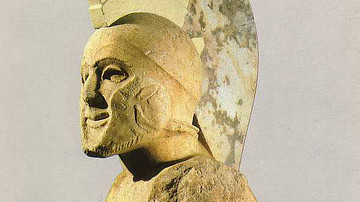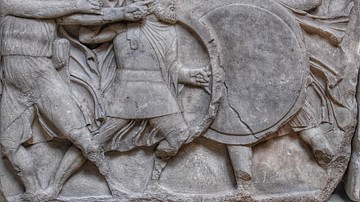
A huge part of the Spartan population was made up of those who were not actually Spartan, the helots; a cause of great concern to the Spartans throughout their history. These helots were slaves that were usually captives of the Spartans forced into the service of their captors. However, some of these slaves were awarded their freedom after spending time in the service of the hoplites of the Spartan Army. These freed helots of military service were known as the 'Neodamodeis'.
Neodamodeis (νεοδαμώδεις) literally means those who are new to the people; 'lately made one of the people'. This comes from the Greek words νέος meaning 'new' and δῆμος meaning 'people' or 'community'. A simple use of terminology to describe a simple concept. While the study of helots has been a topic of great interest in modern scholarship there is little to be said on the helot who was freed or became a part of the wider Spartan society.
The first appearance of the term Neodamodeis comes from Thucydides who uses it in passing without explaining the term or its origin. Ducat does attempt to place an approximate date on the origin of the term and the idea. Ducat's book Les Hoplites (1990 CE) asserts that the term originated in line with the episode concerning the Brasidians where the Helots were freed after taking part in the expedition of Brasidas in 424 BCE. Neodamodeis are certainly attested after 424 BCE from at least 396 BCE in relation to the part of the Spartan army in Agesilaus II's campaign in Ionia.
Lazenby explains that the neodamodeis could still serve in the Spartan army but were distinct from the helot soldiers they had once been. This assertion is made in relation to Brasidas again when they are first mentioned in connection with his soldiers return from Thrace in 421 BCE. This is recorded in Thucydides who explains that these neodamodeis were not in fact free at the time of returning but were earmarked for freedom and hence distinguished from the remaining helots. Thucydides tells us that these men were given their freedom shortly after the event and were then settled with the neodamodeis already settled at Lepreon on the border of Spartan territory. This tells us that neodamodeis were named so before actually being freed on the understanding that they would soon be freed, that they were given extra status on that understanding alone, and then that when freed they were kept in close association with Sparta still. The episodes at Lepreon in Thucydides also show that neodamodeis likely stayed under the direction of the Spartan army though no longer slaves and served as non-citizen hoplites. Hesychius of Alexandria explains that the neodamodeis, while freed from the helot status, never acquired full citizenship.
There are few other references to neodamodeis in the ancient texts in comparison to those for helots (Εἵλωτες). Athenaeus makes mention of them in his Deipnosophists, 6.102. And Xenophon and Plutarch make a few references to them in relation to their analysis of Spartan society and history. Not much can be said for the freed slaves of the Spartan world but the Neodamodeis give us a brief glance into the lives of those without a voice.






